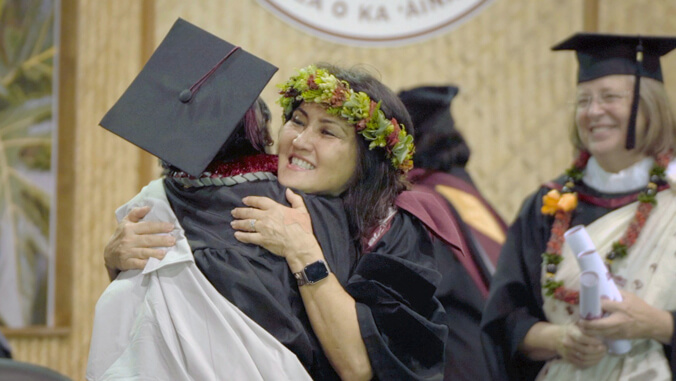“It’s the most amazing feeling to be here back home,” said Susan Kazama, who was named the chancellor of Hawaiʻi Community College in July 2024. Born and raised in Hilo, Kazama first returned home after almost 40 years away to serve as interim Hawaiʻi CC chancellor a year earlier.
Hawaiʻi CC launched the fall semester with a faculty and staff meeting in August, where Kazama was served ʻawa and participated in a hula.
- Related UH News story: Susan Kazama returns home to lead Hawaiʻi CC, July 23, 2024
Integrating Native Hawaiian values
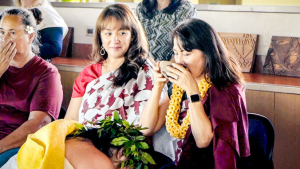
“We want to make sure that we integrate Native Hawaiian values as part of the curriculum, part of the values and part of the culture of the college,” Kazama said, noting that more than half the the students there are Native Hawaiian or Pacific Islander. “It is really important that we make sure we help our keiki and our Native Hawaiian students thrive on this island and in the institution.”
She has already embraced the host culture in multiple ways, joining the campus halau and journeying for a cultural exchange through the Hawaiʻi Pāmaomao program over the summer.
“It’s not just hula to me,” she said “It was about learning the culture and the values because one of the things that they teach us at the I Ola Hāloa Center for Hawaiʻi Life Styles is more about some of the integrity and the respect that you learn from the hula messages that come out from the dance. It is how to respect the land, how to respect the ʻāina, how to respect the people, how you ask rather than take.”
Thriving on island
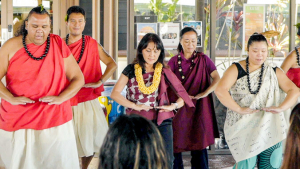
Hula is one of Hawaiʻi CC‘s unique certificate programs, another is agroforestry. Developing and growing programs focused on building the skilled workforce across industries is another important goal.
“That means getting students into internships and apprenticeships on this island—78% of the students that come to Hawaiʻi CC stay on this island. So what that means to me is that we need to build the workforce in our community,” Kazama said. “We need to make sure that they are going to live here, stay here and get a living wage job because they need to be able to thrive on this island.”
This can be challenging for the large geographic area served by the Manono campus in Hilo, the Kō Education Center in North Hawaiʻi and the Pālamanui campus in West Hawaiʻi. Kazama said Hawaiʻi CC might be experimenting with shorter eight-week courses this semester to try to shorten the time for some certifications.
Promoting sustainability
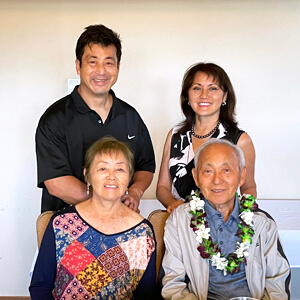
A third goal is promoting sustainability for the land and the culture, and showing students how to grow and thrive on Hawaiʻi Island. She points to the college’s three-acre farm Mauliola through which agriculture students are providing fresh produce to the Hawaiʻi Food Basket, with geographic and programmatic expansion of the agriculture programs on the horizon.
“I grew up as a farmer’s daughter,” Kazama said. “My parents both come from farm people—my mom from a 100-acre farm in ʻĀhualoa and my dad is from Pepeʻekeo, but has a degree in agriculture and has always grown his own produce.”
She said exciting geographic and programmatic expansion is on the horizon for the campus.
‘Stronger together’
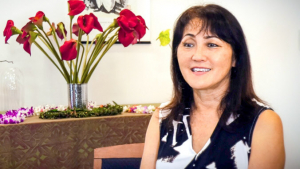
The key to Hawaiʻi CC’s success is its people, according to Kazama, who returned to Hawaiʻi Island after serving at four other University of Hawaiʻi campuses.
At Hawaiʻi CC, everyone is welcomed with aloha, she said, and everyone strives to go a little bit further. For example, if a visitor asks where the cafeteria is, someone will walk them there instead of just pointing them in the right direction. According to Kazama, everyone working together in that spirit is ultimately what will make the campus successful.
“We are stronger together,” Kazama said. “We all need to help each other, and be that community spirit that we are all proud of for Hawaiʻi CC.”
